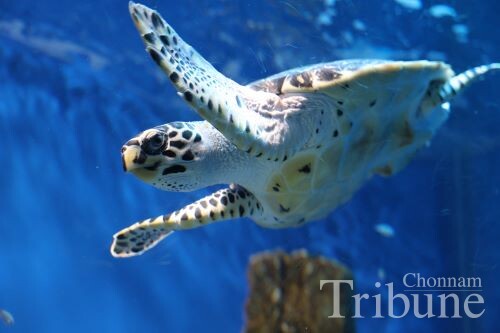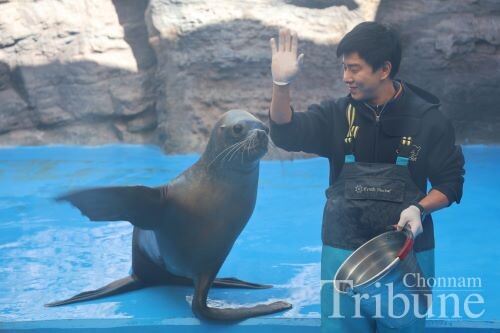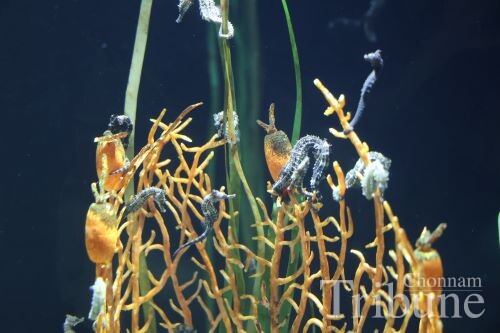
Interactions between humans and other living beings have become an important issue as public awareness of animal rights grows in modern society, with coexistence being a goal that humans should strive to achieve. Aquariums are often criticized for failing to provide suitably healthy environments for their animals, while some have even been discovered to employ abusive practices in the training of their animal performers. Despite, or perhaps in reaction to these criticisms, some responsible aquariums have striven to promote humane coexistence with marine life through conservation and biodiversity protection activities. The Chonnam Tribune visited Aqua Planet Yeosu to review their commitment to species conservation and learn more about ecological activities.
Exploring Aqua Planet Yeosu
Aqua Planet Yeosu runs several marine ecosystem conservation activities, including ecological briefing sessions with sea lions and African penguins, as well as educational programs such as “People Who Work at the Aquarium,” which provides career exploration opportunities to young students, and “Please Take Care of the Sea,” focusing on marine ecology and safety education. These programs aim to raise awareness and inspire future generations to protect marine environments. The facility also collaborates with local organizations to enhance conservation efforts and promote community involvement in marine protection.
The aquarium also conducts educational and training programs, with a particular focus on sea turtle protection and conservation research. It has been designated a habitat preservation institution and a marine animal rescue and treatment center by the Ministry of Oceans and Fisheries since 2013. As a specialized rescue and rehabilitation facility for marine animals, Aqua Planet is fostering a deeper appreciation of marine ecosystems among its visitors.

Ecological Briefings and Educational Programs
After observing a captivating sea lion feeding session, where the sea lions interacted closely with their keepers, the Tribune reporter I explored Aqua Planet’s other ecological education programs. Such programs can play a crucial role in increasing students’ curiosity about aquatic animals, encouraging them to pursue occupations related to marine life and ecology. Ecological Education Administrator Choi Kyeong-ho said, “We offer indoor and outdoor programs for visitors to teach students about the duties of aquarists and their outreach activities, and to raise awareness about marine conservation, suggesting practical actions that students can take in their own communities.”
He concluded the interview by introducing some of the aquarium’s future ecological programs. “Aqua Planet Yeosu is planning to offer programs focused on sea turtle conservation research at the aquarium, as well as to construct a new facility that will allow visitors to observe sea turtles up close.” The reporter was impressed by Aqua Planet Yeosu’s contributions to marine conservation and felt eager to participate in the programs, which offer a chance to better understand and appreciate marine life.

Conservation and Research Projects
Though all seven species of sea turtles are protected in many countries, and extensively researched by well-funded organizations, Korea doesn’t yet have much infrastructure dedicated to studying or protecting them. Aqua Planet was therefore designated as an institution to perform research, habitat preservation, and marine animal rescue work for these extremely vulnerable creatures. Aquarist Shim Gyu-seok explained, “Aqua Planet Yeosu is conducting artificial propagation research for sea turtle species found in Korea, successfully releasing green sea turtles and hawksbill sea turtles into the wild. We treat and release turtles caught accidentally.” He shared his complex feelings about releasing turtles into the wild, expressing concern about their survival at first but later how his concern turned into relief upon finding thriving turtles through GPS tracking.
Following this briefing, the reporter was able to meet turtles kept for research purposes, those awaiting treatment, and individuals born through artificial reproduction, along with lined seahorses also being artificially propagated as a conservation measure. To meaningfully contribute to ethical coexistence between humans and marine life, Aqua Planet needs to continue balancing its revenue-generating programs with its conservation efforts, such as research projects, and conservation activities, promoting sustainable marine practices.
Aqua Planet Yeosu is a facility with more than 300 species of aquatic life. It is divided into three exhibits, each with its own unique theme. At the aquarium, visitors can observe many marine animals and gain a sense of interaction with them, creating a special experience that makes guests feel as if they are immersed in the ocean. Additionally, it is a place where visitors can learn about coexistence with marine life and experience the importance and necessity of marine ecosystems. “I always had some compassion for the marine animals in the aquarium, but now I appreciate how efforts directed toward their conservation open a path for coexistence,” said Park Sung-yoon, who visited the aquarium on Feb. 13. How about taking a trip to Aqua Planet Yeosu and gaining new insight into coexistence through your own special experience?
By Choi Ji-yoon, Reporter
